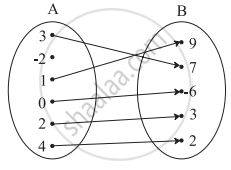Advertisements
Advertisements
प्रश्न
If ƒ(m) = m2 − 3m + 1, find f(x + 1)
उत्तर
f(x + 1) = (x + 1)2 – 3(x + 1) + 1
= x2 + 2x + 1 – 3x – 3 + 1
= x2 – x – 1
APPEARS IN
संबंधित प्रश्न
Let A = {−2, −1, 0, 1, 2} and f : A → Z be a function defined by f(x) = x2 − 2x − 3. Find:
(a) range of f, i.e. f(A).
Let f : R+ → R, where R+ is the set of all positive real numbers, such that f(x) = loge x. Determine
(b) {x : f(x) = −2}
If f(x) = cos (log x), then value of \[f\left( x \right) f\left( 4 \right) - \frac{1}{2} \left\{ f\left( \frac{x}{4} \right) + f\left( 4x \right) \right\}\] is
The range of the function \[f\left( x \right) = \frac{x^2 - x}{x^2 + 2x}\] is
The domain of the function \[f\left( x \right) = \sqrt{\frac{\left( x + 1 \right) \left( x - 3 \right)}{x - 2}}\] is
The range of \[f\left( x \right) = \frac{1}{1 - 2\cos x}\] is
If f(m) = m2 − 3m + 1, find f(−3)
Check if the following relation is a function.

If f(m) = m2 − 3m + 1, find f(0)
Find x, if f(x) = g(x) where f(x) = x4 + 2x2, g(x) = 11x2
Find the domain and range of the following function.
f(x) = 7x2 + 4x − 1
Express the following exponential equation in logarithmic form
`"e"^(1/2)` = 1.6487
Express the following exponential equation in logarithmic form
e–x = 6
Express the following logarithmic equation in exponential form
`log_(1/2) (8)` = – 3
Answer the following:
Simplify, log (log x4) – log (log x)
Answer the following:
Find the domain of the following function.
f(x) = 5–xPx–1
The data in the adjacent table depicts the length of a person's forehand and their corresponding height. Based on this data, a student finds a relationship between the height (y) and the forehand length (x) as y = ax + b, where a, b are constant.
| Length ‘x’ of forehand (in cm) |
Height 'y' (in inches) |
| 35 | 56 |
| 45 | 65 |
| 50 | 69.5 |
| 55 | 74 |
Find the length of forehand of a person if the height is 53.3 inches
The range of 7, 11, 16, 27, 31, 33, 42, 49 is ______.
Find the domain of the following function.
f(x) = [x] + x
The domain of the function f(x) = `sin^-1((|x| + 5)/(x^2 + 1))` is (–∞, –a] ≈ [a, ∞). Then a is equal to ______.
